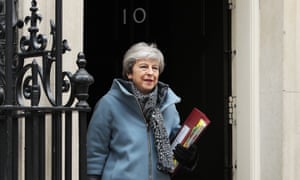PM says she will not stand in way of desire for new approach but DUP remains opposed to deal
Theresa May UK prime minister vows to resign before next phase of Brexit if deal is passed PM says she will not stand in way of desire for new approach but DUP remains opposed to deal BrexitAll eight indicative vote options defeated by MPs – live May's uphill battleDUP and ERG 'Spartans' to vote against deal Opinion Farewell to the worst PM bar none – until the next one
Assinar:
Postar comentários (Atom)
Postagem em destaque
Ao Planalto, deputados criticam proposta de Guedes e veem drible no teto com mudança no Fundeb Governo quer que parte do aumento na participação da União no Fundeb seja destinada à transferência direta de renda para famílias pobres
Para ajudar a educação, Políticos e quem recebe salários altos irão doar 30% do soldo que recebem mensalmente, até o Governo Federal ter f...
-
更新时 秘鲁主要金矿开采区数千名矿工举行示威,抗议当局实施严厉措施,打击非法采矿。 根据政府实施的新规定,非法采矿...
-
Aqui no Não Curto você pode ver todos os programas da Rede Globo ao vivo e online. De segunda a segunda a programação completa da emissor...
-
Delação de Léo Pinheiro, da OAS, envolve Aécio e Geddel A delação premiada de um dos principais investigados na Lava Jato, o execu...

Nenhum comentário:
Postar um comentário